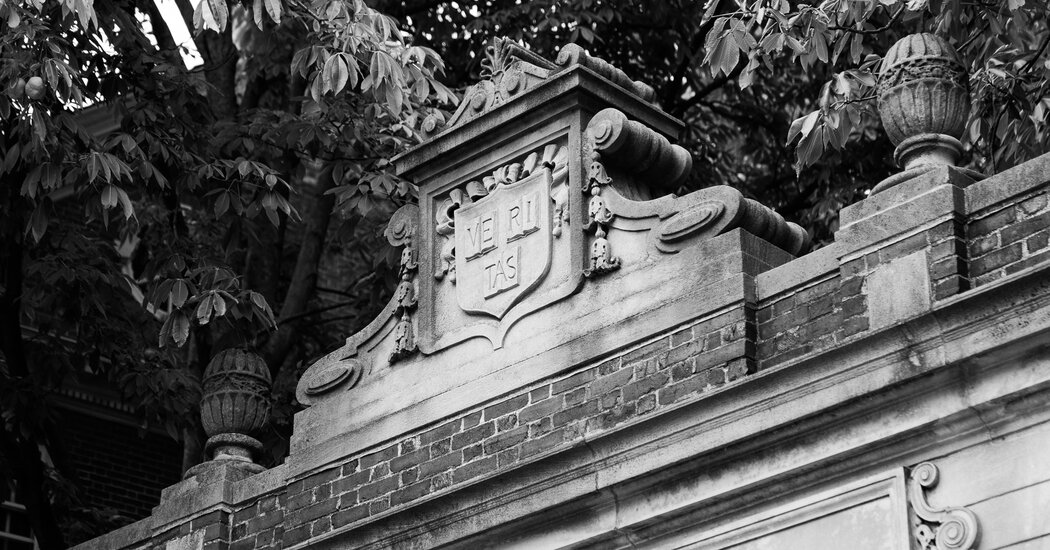The U.S. government is trying to bludgeon America’s elite universities into submission. At stake is the future of institutions that graduated most of our recent American presidents, the vast majority of Supreme Court justices and that serve as drivers of our prosperity and shapers of our social values.
The Trump administration’s threats to withdraw billions of dollars in funding are little more than extortion. They must be resisted using all available legal means. Columbia University’s recent capitulation, in which it agreed to a raft of changes in an attempt to avoid losing hundreds of millions in funding, must not be emulated. Each act of capitulation makes the next one more likely. Each act of rectitude reverberates.
As in most confrontations, the merits in this one are far from one sided. Critics of elite universities, including Harvard, where I am a professor, are right that they continue to tolerate antisemitism in their midst in a way that would be inconceivable with any other form of prejudice, that they have elevated identity over excellence in the selection of students and faculty, that they lack diversity of perspective and that they have repeatedly failed to impose discipline and maintain order.
And universities’ insistence that they be entirely left alone by their federal funders rings hollow in light of the enthusiasm they greet micromanagement when they approve the outcome, such as threats from Washington to withhold funds unless men’s and women’s athletic budgets were equalized.
But the Trump administration is not acting in good faith in its purported antisemitism concerns, nor is it following the law in its approach to universities.
President Trump offered praise to a white-supremacist rally that included chants of “Jews will not replace us,” publicly dined with Holocaust deniers, made common cause with Germany’s Nazi-descendant AfD party and invoked tropes about wealthy Jews. The true motivation behind his attack on universities is suggested by Vice President JD Vance’s declaration that the “universities are the enemy.” Shakedown is the administration’s strategy as it has gone after law firms, federal judges, legislators who disagree with its edicts and traditionally independent arms of the government.
Title VI of the 1964 Civil Rights Act appropriately allows that federal funding of universities can be made contingent on their avoiding discrimination. But as a recent statement by a group of leading law professors points out, it also protects against this power’s being used to punish critics or curtail academic freedom. Among the law’s requirements are notice periods, hearings, remedies that are narrowly tailored to specific infractions and a 30-day congressional notification before any funding is curtailed.
None of this appears to be part of the Trump administration’s approach to universities.
The White House has not confined its efforts to claims about discrimination. The administration seeks to dictate what universities do on matters ranging from student discipline to academic organization to campus policing.
Universities facing those threats should make clear they are willing to negotiate with government officials only over matters covered by statute and through the procedures laid out in the law.
They should make clear that their formidable financial endowments are not there to simply be envied or admired. Part of their function is to be drawn down in the face of emergencies, and covering federal funding lapses surely counts as one. As a former president of Harvard University, believe me when I say that ways can be found in an emergency to deploy even parts of the endowment that have been earmarked for specific use by their donors.
And to maintain the moral high ground, which universities have in large part lost, they need a much more aggressive reform agenda focused on antisemitism, celebrating excellence rather than venerating identity, pursuing truth rather than particular notions of social justice and promoting diversity of perspective as the most important dimension of diversity.
That will not happen through universities’ usual deliberative processes, which give too much power to faculty members who have political agendas. It will require strong, determined leaders backed by confident and competent trustees. I wish Harvard and other universities had reformed much more rapidly after the Hamas attacks of Oct. 7, 2023, so their changes did not appear to be a response to external pressure.
Institutions such as Harvard, the administration’s most recent target, have vast financial resources, great prestige and broad networks of influential alumni. If they do not or cannot resist the arbitrary application of government power, who else can? Without acts of resistance, what protects the rule of law?
I hope and trust, in the time of testing that lies ahead, universities will both reform themselves and stand up to external pressure. Their future and America’s are in the balance.
Lawrence H. Summers, a contributing Opinion writer, is a former president of Harvard University, where he is currently a professor. He was Treasury secretary under President Bill Clinton.
The Times is committed to publishing a diversity of letters to the editor. We’d like to hear what you think about this or any of our articles. Here are some tips. And here’s our email: [email protected].
Follow The New York Times Opinion section on Facebook, Instagram, TikTok, Bluesky, WhatsApp and Threads.
The post If Powerful Places Like Harvard Don’t Stand Up to Trump, Who Can? appeared first on New York Times.


















